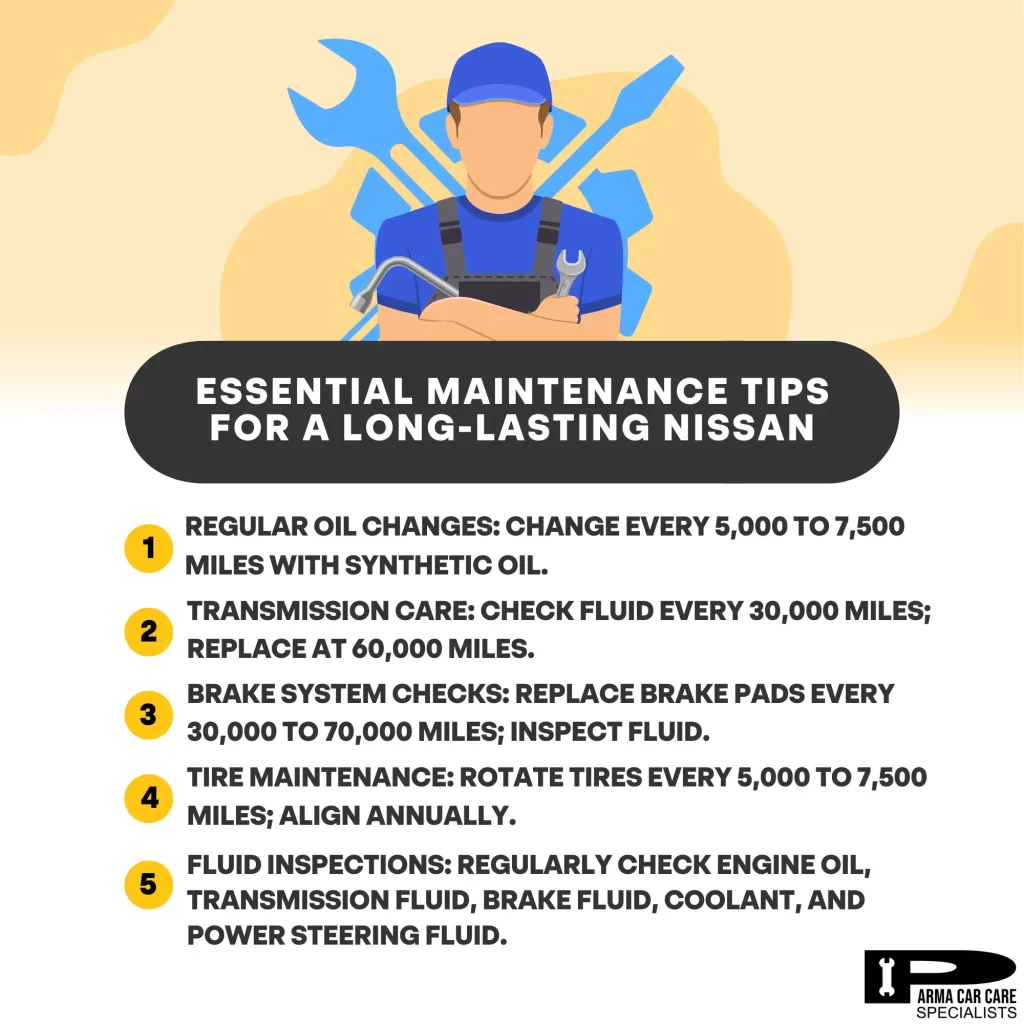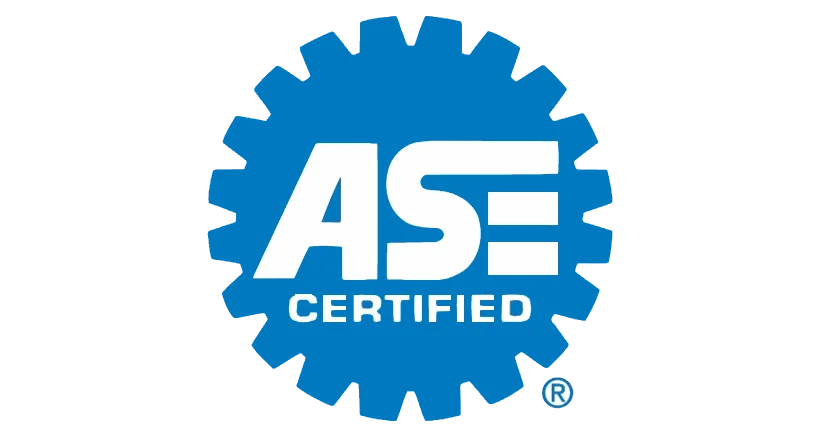Guaranteeing your Nissan’s longevity requires diligent high-mileage maintenance. Regular oil changes every 5,000 to 7,500 miles, using synthetic oils, are essential. Transmission fluid should be checked every 30,000 to 60,000 miles with replacements at 60,000 miles. Inspect brake pads, rotors, and fluid levels routinely, aiming to replace pads every 30,000 to 70,000 miles. Maintain proper tire pressure, rotate every 5,000 to 7,500 miles, and align annually. Regularly inspect engine oil, transmission fluid, brake fluid, coolant, and power steering fluid. Keeping these systems in check will greatly extend your vehicle’s life. Discover more detailed tips and strategies going forward.

Key Takeaways
- Perform regular oil changes every 5,000 to 7,500 miles to ensure optimal engine lubrication.
- Check and replace transmission fluid and filter every 60,000 miles to maintain transmission health.
- Inspect and replace brake pads and fluid every 30,000 miles for reliable braking performance.
- Rotate tires every 5,000 to 7,500 miles to promote even wear and extend tire life.
- Regularly inspect and maintain fluid levels, including coolant, brake fluid, and power steering fluid, to prevent potential damage.
Regular Oil Changes
Regular oil changes are vital to guaranteeing your Nissan’s engine remains lubricated and runs efficiently, especially as the mileage increases. For a Nissan Maxima, maintaining a regular oil change schedule is fundamental to its longevity. You might wonder, ‘How long do Nissan Maximas last?’ With proper care, including timely oil changes, a Maxima can often exceed 200,000 miles.
You should aim to change the oil every 5,000 to 7,500 miles, depending on your driving conditions and the type of oil used. Synthetic oils tend to offer better protection and longer intervals between changes. It’s not just about the oil itself; the oil filter also plays a key role in trapping contaminants and keeping the engine clean. Replacing the filter with each oil change guarantees that your engine remains free from harmful particles.
Neglecting oil changes can lead to sludge buildup, reduced engine efficiency, and increased wear and tear. Over time, this neglect can greatly shorten the lifespan of your Maxima. By adhering to a strict oil change regimen, you’re actively preventing costly repairs and guaranteeing your Maxima remains reliable for years to come.
Transmission Care
Just as oil changes are vital for engine health, maintaining your Nissan’s transmission is equally important to guarantee smooth shifting and prolonged vehicle life. Proper transmission care can greatly impact how many miles a Nissan Maxima lasts, potentially extending it well beyond 200,000 miles.
To keep your transmission in peak condition, consider the following detailed maintenance steps:
- Regular Fluid Checks: Transmission fluid is the lifeblood of your gearbox. Check it every 30,000 to 60,000 miles. Low or dirty fluid can cause erratic shifting and damage.
- Fluid Replacements: Replace the transmission fluid and filter per the manufacturer’s recommendations, typically every 60,000 miles. This prevents debris build-up and guarantees smooth operation.
- Monitor for Leaks: Regularly inspect under your vehicle for transmission fluid leaks. Early detection can prevent more severe damage and costly repairs.
- Software Updates: Confirm your vehicle’s transmission control module software is up-to-date. Manufacturers release updates that can enhance performance and longevity.
Brake System Checks
Consistently maintaining your brake system in ideal condition is vital for both safety and extending the lifespan of your Nissan. Regular brake system checks should include examining brake pads, rotors, and fluid levels. Brake pads generally need replacement every 30,000 to 70,000 miles, depending on driving habits and conditions. Inspecting the rotors for warping or significant wear is important, as these components guarantee smooth braking performance and prevent potential accidents.
Brake fluid plays a key role in your vehicle’s braking efficiency. It’s recommended to check and replace brake fluid every two years or 30,000 miles, whichever comes first. Contaminated fluid can lead to a spongy brake pedal feel and reduced braking power. Additionally, verify there are no leaks in the brake lines, as these can compromise the entire system.
Tire Maintenance
After confirming your brake system is in excellent condition, it’s imperative to focus on tire maintenance to guarantee peak performance and safety for your Nissan. Proper tire care not only extends the lifespan of your tires but also contributes greatly to how long do Nissans last.
Start by verifying that your tires are always inflated to the manufacturer’s recommended pressure. Under-inflated or over-inflated tires can lead to uneven wear, reduced fuel efficiency, and compromised handling. Additionally, make it a habit to check for tire wear and tear regularly. Look for signs like cracks, bulges, or foreign objects that could jeopardize the integrity of your tires.
Here are key tire maintenance steps you shouldn’t overlook:
- Tire Rotation: Rotate your tires every 5,000 to 7,500 miles to promote even wear and prolong their lifespan.
- Wheel Alignment: Get your wheels aligned at least once a year to guarantee proper handling and prevent uneven tire wear.
- Tire Balancing: Balance your tires whenever you replace or rotate them to avoid vibrations and extend their longevity.
- Tread Depth: Regularly check the tread depth using a tread depth gauge. Replace tires when the tread is below 2/32 of an inch for ideal safety.
Fluid Inspections
Guaranteeing your Nissan’s longevity and performance involves meticulous fluid inspections, as they play a crucial role in maintaining the vehicle’s mechanical health. Regularly checking your engine oil, transmission fluid, brake fluid, coolant, and power steering fluid can greatly improve your Nissan life expectancy.
Start with the engine oil; inspect its level and color. Fresh oil is amber, while old oil turns dark. Low or dirty oil can cause severe engine damage. Follow the recommended oil change intervals specified in your Nissan’s manual.
Transmission fluid needs attention too. It should be pinkish and transparent. If it’s dark or has a burnt smell, it’s time for a change. Neglecting this can lead to transmission failure, shortening your Nissan’s life.
Brake fluid is another critical component. Over time, it absorbs moisture, reducing its effectiveness and potentially causing brake failure. Check its level and replace it as per the manufacturer’s guidelines.
Coolant maintains engine temperature. Verify it’s at the correct level and replace it if it appears rusty or sludgy. Power steering fluid should also be checked and topped off regularly to guarantee smooth steering.
Conclusion
To sum up, adhering to these maintenance tips can greatly extend your Nissan’s lifespan. Did you know that regular oil changes can increase an engine’s life by up to 75%? By focusing on oil changes, transmission care, brake system checks, tire maintenance, and fluid inspections, you guarantee your vehicle runs smoothly for years. These detailed steps aren’t just for longevity but also for peak performance, providing you with a reliable and efficient driving experience.
















